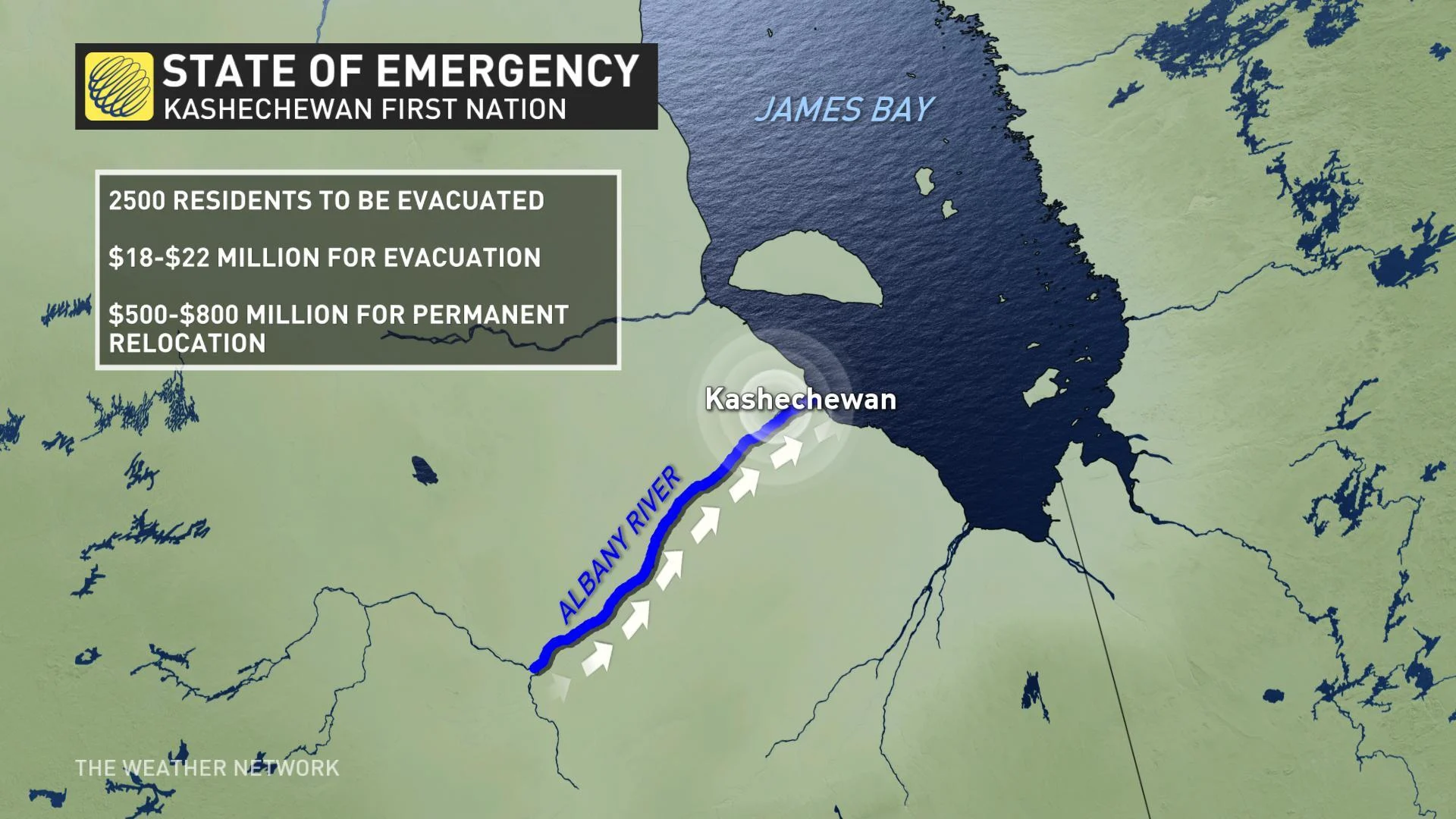
Kashechewan First Nation: Flooding sparks state of emergency
Frustration with the federal government is mounting as Kashechewan First Nations, a northern Ontario community that routinely floods every year, declares a state of emergency and prepares to evacuate.
Kashechewan is a Cree community on the James Bay coast and every spring its residents must leave temporarily to escape the floodwaters of the Albany River.
About 2,500 community members were preparing to leave the reserve on April 21, but those plans have been moved up to Monday as last winter's heavy snowfall begins to melt.
"We the council have declared a state of emergency. Our actions are moved by our duty to protect our people," Chief Leo Friday wrote in a Facebook post.
"We have no choice but to make sure that we take every precaution to ensure their safety."

(The evacuation of the flood-prone James Bay community of Kashechewan happens almost every year as the ice breaks up on the Albany River. Martine Laberge/Radio-Canada)
Friday, on behalf of the council and local community, invited both Indigenous Services Minister Seamus O'Regan and Prime Minister Justin Trudeau to visit.
A spokesperson for the department of Indigenous Services said the government is in communication with the community about what to do next.
"We recognize that the threat of flooding during spring breakup is an ongoing reality for communities along the James Bay and Hudson Bay coasts," said Kevin Deagle on Sunday.
"We are currently working with the First Nation to monitor the threat of flooding, conduct preliminary flood mitigation work through dike repairs, and support them in the transition to host communities. ... We will continue to stay in direct communication with the community to address their needs in this challenging time."
Timmins NDP MP Charlie Angus said children, young families and elders will start to leave the community on Monday and evacuations will continue the rest of the week.
He said the move can be a traumatic time for the elderly, sick and for young children who are forced to move schools. Plus, there's always the fear of coming back to a devastated community, he added.
"We never know until the ice jams break whether this is the catastrophic year that wipes out the community. We are playing Russian roulette with peoples' lives," said Angus. "Everybody deserves to live in a safe community."

RELOCATION FRUSTRATIONS
The First Nation has been waiting for Ottawa to fulfil a promise to relocate them to higher ground ever since it signed an a tripartite agreement with the federal and provincial governments.
NDP MPP Guy Bourgouin, who represents Mushkegowuk—James Bay, said since then people have felt betrayed.
"It's been close to three years since they signed and yet nothing has happened. It's pretty disheartening for the community to be derooted every spring. It would be unacceptable anywhere else in the province, anywhere else in Canada, to say the least," he said.
"It's unacceptable."
Bourgouin said he feels like both the provincial and federal governments are to blame for the holdup.
Those feelings of frustration are echoed by the grand chief of the territory governing Kashechewan First Nation, Jonathan Solomon.
"They need to stop playing politics with the lives of the people," he said. "Get serious. What is it going to take to be able to expedite the process? Is it going to take lives to be lost? Is that what they're waiting for?"
PHILPOTT QUESTIONS COMMITMENTS
The issue was raised in the House of Commons late last week when independent MP Jane Philpott — who served in the Liberal cabinet as Indigenous Services minister and Treasury Board president before resigning in protest over the SNC-Lavalin affair — said Chief Friday called her recently to voice concerns about the risk facing his community and the resiliency of the dike protecting it.
"Our country spends millions of dollars annually for evacuations and for repairing flood-damaged homes," Philpott said. "When can we expect a serious commitment to funding the relocation that the community has been asking for years?
Last week, O'Regan said the government remains committed to relocation and is still working on the technical aspects of the move.
"It takes a lot more time than I think we would all like," O'Regan said.
"In the meantime, our officials and the community are in touch all the time to make sure that this move once again happens as seamlessly as possible."
This article was originally posted on CBC.ca with files from Olivia Stefanovich









